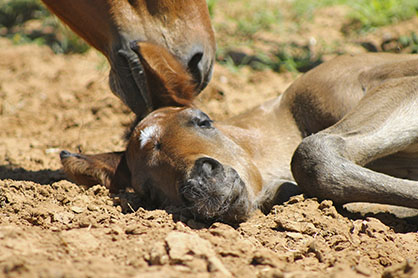Orphan Foals: Success is Possible With an Emergency Feeding Program
With proper nutrition and veterinary support, orphan foals can become healthy, thriving adults.
Spring is here and so is peak foaling season. While an exciting time with frolicking foals, having a plan for the unexpected can help alleviate stress in case a mare is unable to care for her baby. To help orphan foals through the tough early stages of life, experts at the Purina Animal Nutrition Center have developed an emergency feeding program.
“As foals age, their nutrition requirements change rapidly,” says Karen E. Davison, Ph.D., director & nutritionist with Equine Technical Solutions at Purina Animal Nutrition.
Ensure orphan foals receive the best nutrition by following these recommendations:
Day 1-
It’s important to feed colostrum to the foal within the first two hours of life.
“Colostrum, or “first milk,” provides antibodies needed to build a foal’s immune system and fight diseases,” explains Davison. “After 18 to 24 hours, foals can no longer absorb antibodies in colostrum.”
Check with your veterinarian to discuss the need for any medications or vaccines and if the newborn has the proper immunoglobulin levels.
Days 2 to 6-
After a foal has consumed an adequate amount of colostrum, they can be encouraged to accept a foal milk replacer and gradually increase daily intake. Milk replacer should be mixed and fed per directions. Feeding watered down replacer will not give the foal the needed nutrients. Overly concentrated milk replacer can cause digestive upset and scours.
“It is important to choose a milk replacer formulated specifically for foals,” says Davison. “Mare’s milk is different from other species in protein, fat, and sugar content and it is important for a milk replacer to mimic the nutrient content of mare’s milk as closely as possible.”
Foals should be fed four to six times a day with bottle feedings or taught to drink from a bucket.
Days 7 to 28
Continue feeding milk replacer in four to six feedings daily and begin to introduce dry feed. Foals in this stage will nibble at dry feed and may begin to eat small amounts of hay or grass.
Days 28 to 42
At one month of age, gradually reduce the intake of milk replacer and feeding frequency while increasing the amount of dry feed. Continue to offer dry feed in several small meals throughout the day. Choose dry feed formulated for foals and offer 1 pound per month of age per day, along with the recommended amount of liquid milk replacer.
Days 42 to 90
At three months of age, foals can be successfully weaned off liquid milk replacer if they are consistently consuming 3 pounds per day of dry feed formulated for growing horses.
“Ideally, foals at this stage should eat at least three meals per day,” says Davison.
If hay or pasture quality is good and available, Davison says to continue increasing the amount of hay to 1-1.5 pounds per 100 pounds of body weight, and feed in addition to dry feed for growing horses. If hay or pasture quality is poor, foals can transition to a complete feed formulated for young horses, which will provide both concentrate and high quality fiber.
Be watchful
Throughout the first three months, keep a close eye for health challenges in orphan foals. Your veterinarian should be involved during all stages of your foal’s growth. Being on the same page as your veterinarian can prevent problems or illness and make treatment easier if necessary. Your veterinarian can also recommend a health and immunization program.
“An orphan foal feeding program will not exactly mimic the feeding behavior and nutrition of a suckling foal nursing its mom,” says Davison. “Some orphans may go through awkward growing periods but a well-implemented feeding program can minimize any long-term growth problems.”
Many orphaned foals have been raised successfully on this feeding program, growing up to have excellent, competitive careers.
For more information on broodmare and foal nutrition, visit purinamills.com/horse-feed.
Purina Animal Nutrition, LLC (www.purinamills.com) is a national organization serving producers, animal owners and their families through more than 4,700 local cooperatives, independent dealers and other large retailers throughout the United States. Driven to unlock the greatest potential in every animal, the company is an industry-leading innovator offering a valued portfolio of complete feeds, supplements, premixes, ingredients and specialty technologies for the livestock and lifestyle animal markets. Purina Animal Nutrition is headquartered in Shoreview, Minn., and a wholly owned subsidiary of Land O’Lakes, Inc.











